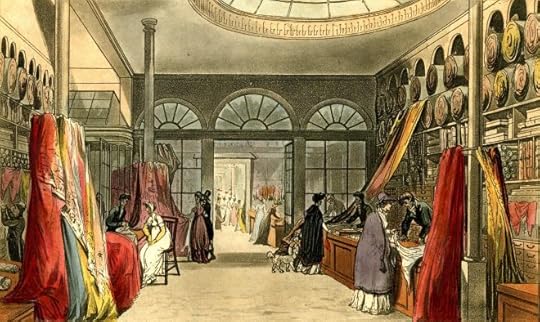Jude Knight's Blog, page 64
February 28, 2021
Tea with the Earl of Monteith

The Earl of Menteith was a personable young man. Handsome, too, and large—he had taken one look at her small dainty chairs and seated himself on the sofa. Also worried about something, and wondering how much to tell her.
The Duchess of Haverford poured him a cup of tea and asked his opinion of the weather, the company in town, and the situation on the continent, with Napoleon banished to Elba without his wife and son, who had returned to her family in Austria.
He answered gracefully to each conversational gambit, but none captured his enthusiasm.
Since Menteith had asked to make this call, Eleanor would wait for him to introduce the topic. “Another cup?” she asked.
“Not for me, Your Grace.” He studied one large hand, then looked up to see her watching him. “Ye may be wondering why I asked to see ye.”
Eleanor inclined her head in agreement, raising her brows slightly to encourage him to continue. The slight Scots burr was delightful. With those looks and that voice, he must be very popular with the young ladies.
“They tell me ye know everyone in the Upper Ten Thousand. I hoped ye might have heard of someone I need to find.”
“I am happy to help if I can,” the duchess assured him.
“The thing is…” Menteith paused, then continued…”I’m not at liberty…” he sighed. “ That is, I do not want to discuss my reasons. I hope ye’ll still help me, Your Grace?”
“If I can,” she said, and then added, since his blunt honesty deserved hers, “if I think telling you will not cause harm.”
He was startled at the thought. “I mean no harm. To the contrary.” He bit his lower lip then blurted. “I am looking for the Comtesse de Fontenay. Or the Comte. Do ye know them, Your Grace? Can ye tell me where I might find them?”
Eleanor wrinkled her brow as she thought. The name de Fontenay rang a bell, but she could not quite recall… “Émigrés?” she asked.
“Perhaps. I am unsure.” He lifted his broad shoulders in a shallow shrug. “Probably.”
“Yes,” Eleanor said. It was coming back to her now. The old scandal—but it had faded into oblivion when one of the key players died and the others behaved as if it never existed. Did Menteith know? Surely not; how would he have found out? But if not, why look for Madame de Fontenay?
She wouldn’t raise it with him. Only one person still living had the right to do that. If he was still living.
“I believe the Comte de Fontenay has an estate in Norfolk, Menteith. Or is it Suffolk?” Now what was the place called? “Bloodstone Moor? No. Hall comes into it somehow. Or is it Hill?” Ah yes! That was it. “Bloodmoor Hill. Look for Bloodmore Hill Manor, Lord Menteith. I’m sorry I cannot tell you anything more.”

Malcolm Comyn, the Earl of Menteith, seeks the truth of an anonymous letter that threatens everything he knows about himself. Stranded in Fenwick on Sea by a dreadful storm, he finds more than he expects.
The Comtesse of Midnight: Alina K. FieldA Scottish Earl on a quest for the elusive Comtesse de Fontenay rescues a French lady smuggler from the surf during a devastating storm, and takes shelter with her. As the stormy night drags on, he suspects his companion knows the woman he’s seeking, the one who holds the secret to his identity. When she admits she is, in fact, the Comtesse Fontenay, just not the one he’s seeking, she dashes all his hopes—and promises him new ones.
Storm & Shelter: A Bluestocking Belles Collection With Friends When a storm blows off the North Sea and slams into the village of Fenwick on Sea, the villagers prepare for the inevitable: shipwreck, flood, land slips, and stranded travelers. The Queen’s Barque Inn quickly fills with the injured, the devious, and the lonely—lords, ladies, and simple folk; spies, pirates, and smugglers all trapped together. Intrigue crackles through the village, and passion lights up the hotel.
When a storm blows off the North Sea and slams into the village of Fenwick on Sea, the villagers prepare for the inevitable: shipwreck, flood, land slips, and stranded travelers. The Queen’s Barque Inn quickly fills with the injured, the devious, and the lonely—lords, ladies, and simple folk; spies, pirates, and smugglers all trapped together. Intrigue crackles through the village, and passion lights up the hotel.
One storm, eight authors, eight heartwarming novellas.
Find out more on the Bluestocking Belles’ project page.
Only 99c while on preorder. Published April 13th.







February 27, 2021
Spotlight on A Spirited Courtship
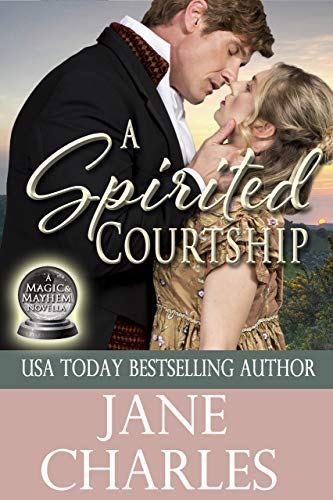
By Jane Charles
Released 2/16/21
Miss Diana Vail had thought she’d found love, but James Bryant, the Earl of Somerton, had only been toying with her affections. Had she not overheard the horrible truth, she might have succumbed to his practice seductions and been ruined for life. Thankfully, her reputation had been saved, though it left her wondering if she could ever trust her heart again.
James Bryant had once professed: If Noah could become a father at the age of five hundred, then I can surely wait to begin producing offspring until age forty. Those were words he’d successfully lived by until Miss Diana Vail stepped into a ballroom. With his vow quickly forgotten, James set out to court the most captivating woman he’d ever met. Then, without explanation, she set him aside.
However, three ghosts have different plans for Diana and James, and intend to bring about a love match. Will the stubborn pair be more than a match for their spirited matchmakers and be doomed to suffer from the ancient curse for eternity?
Spirited Courtship previously appeared in Beguiled at the Wedding, a Castle Keyvnor Anthology.
Amazon – BN – Apple Books – Kobo – Goodreads – BookBub
 Meet Jane Charles
Meet Jane CharlesUSA Today Bestselling Author Jane Charles lives in the Midwest with her former marine, police officer husband. As a child she would more likely be found outside with a baseball than a book in her hand, until one day, out of boredom on a long road trip, she borrowed her sister’s romance novel and fell in love. Her life is filled with three amazing children, two dogs, two cats, community theatre, and traveling whenever possible. Jane may have begun her career writing romances set in the Regency era, but blames being a Gemini as to why she’s equally pulled toward writing contemporary novels.
https://janecharlesauthor.com (website and newsletter)
https://twitter.com/JaneAcharles
https://www.facebook.com/JaneCharlesAuthor
https://www.pinterest.com/JaneAcharles/
https://www.goodreads.com/author/show/4879172.Jane_Charles







February 26, 2021
Ring vaccination and the eradication of smallpox
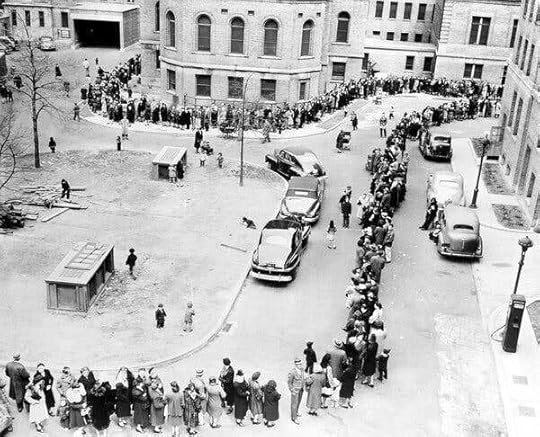
Lines snaked around New York streets when a 1947 outbreak of smallpox led to vaccination of 6 million people in less than a month.
The eradication of smallpox is the one undisputed success story in the long history of humankind’s fight against disease.
Undisputed, did I say? That smallpox is gone is beyond a doubt. No-one has seen it outside of a laboratory since 1977, which makes the last case almost old enough to be historical, if one of us were to write a book about it. (Fifty years or more before the present day is usually suggested as the timespan for ‘Historical’, though we might want to review that in the light of how different the ’70s and ’80s are from the present.)
Yet some argue that vaccination was not the reason for the disappearance of the disease; that it was getting milder as the population grew healthier; that even at its height, the vaccination campaign only reached 10% of the populations of the countries were vigorous vaccination campaigns took place.
Some smallpox was always milderPoint 1: as I discovered when I researched smallpox for To Mend the Broken-Hearted, smallpox always came in two varieties. Variola minor had a death rate of 1%; variola major, on the other hand, killed 30% on average. It’s true that, by the mid-20th century, variola minor was the predominant strain in the United States and the United Kingdom. Nonetheless, variola major continued to scythe its way through communities in the rest of the world, killing 300 million people and occasionally making a visit to the supposedly safer countries, courtesy of international travel. Here are just two examples. An overseas visitor to New York started a massive vaccination campaign in 1947, after he infected 12 people. Two, including the visitor, died. In 1962, a traveller from Pakistan started a smallpox outbreak in Wales.
Twenty-five people contracted smallpox, and six of them died, including a nine-month-old baby. [https://www.bbc.co.uk/history/british...]
In the late 1950s, the World Health Organisation decided the only way to protect the world from such events was to eradicate the disease. Smallpox was ideal for the attempt. [https://www.historyofvaccines.org/con...]
It was easy to recognise. Patients develop a distinctive rash. Time from exposure to rash is short, so the disease usually can’t spread very far before someone notices it.Only humans can transmit and catch smallpox. Many illnesses have an animal species they can also infect, so the disease can hide there and jump back to humans under the right conditions.After surviving smallpox or being immunised, people are protected for a lifetime.Ring vaccinationWhich brings us to point 2. Carefully managed, 10% was enough.
The WHO strategy was to track down every contact of every smallpox case they found, and vaccinate them, thus putting a ring of immune people around the live disease. It’s as simple as that. With a disease that meets the three criteria above, you don’t need herd immunity across the entire population. You simply need to get rid of any case you find by ring-fencing it with people who can’t get smallpox, and therefore can’t pass it on.
Quarantine is essentially the same strategy: you take away any chance smallpox has to jump to a new human host, and the disease dies (at least in that vicinity) when those being treated either recover or die. Except that quarantine tends to be expensive, time consuming, and leaky. Vaccines work better.
In 1977, the last patient in the world to catch smallpox outside of the lab was diagnosed in Somalia.
Ali Maow Maalin, a 23-year-old hospital cook in Merca, had never been successfully vaccinated. After his diagnosis, an intensive tracing and vaccination campaign led to 54,777 people being vaccinated in the next two weeks. The disease was cornered, with no vulnerable hosts nearby to spread to.







February 23, 2021
Investigations and shenanigans in WIP Wednesdays
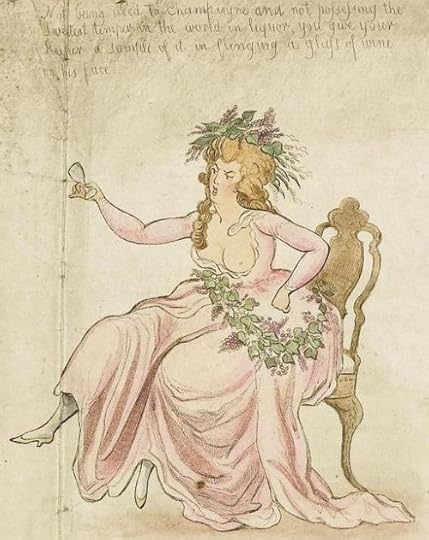
I like a bit of mystery and detection with my romance — a spice of danger somewhat more serious than who kissed whom in the garden. If you do, too, then join my hero and his half-brother as they visit a brothel in search of a missing boy. (And if you have a piece you’d like to share, please pop it in the comments.)
Wakefield took the lead, pointing. “That girl and that one, and one room with a large bed,” he ordered. Aldridge nodded in agreement. Wakefield had contacts among the women who earned their living in the world’s oldest trade; presumably he’d recognised the ones he’d chosen.
The two selected approached, their smiles professional and meaningless. One was dressed in skimpy Grecian robes with her brunette curls dressed high and bound with gold cord—Artemis, from the little toy bow and arrow she carried in one hand. The other wore her fair hair down, flowing over her upper body. A bright scarf was her only covering other than her hair, cinched at the waist by a circlet of flowers that echoed the one on her head. Gauzy wings hinted that she was, perhaps, intended to be a fairy.
“Artemis,” the greeter confirmed with a wave, and, “Ariel,” with a second. “Something to drink or eat, my lords?”
“Perhaps later,” Aldridge said. He slipped an arm around the blonde fairy and sniffed at her flowers. Silk, but he ignored that detail. “Come on, sweet thing. Show me to a bed.”
“The India room,” the greeter decided. Wakefield offered the brunette a raised hand. “Shall we, your divinity?”
She giggled as she placed her hand in his, and raised her nose in the air, slanting a glance to the others in the room to ensure they noticed. Aldridge allowed the woman he was holding to lead the way down a passage.
They stopped at the fourth room on the right, where a partly opened door gave entrance to a brightly decorated room with richly embroidered silken wall hangings and what looked like copies of Hindu template painting in a frieze around the walls. The main feature of the room was a circular bed at least 10 feet across.
Aldridge gave Ariel a gentle push on her bottom to propel her further into the room so that he could disengage, then put out a hand to catch her wrist as she reached for her belt. “Don’t disrobe,” he said, as Wakefield escorted Artemis inside and turned to shut and secure the door.
The fairy attempted to rub herself against Aldridge as he held her away from him by the wrist. “How may I please you, my lord?” she asked.
“Information, Sukie, and an alibi,” Wakefield said, drawing the attention of both women. Their poise slipped as they narrowed their eyes at him. He had been examining the walls, and now led them all to the corner of the bedchamber nearest to the window.
With his back to the room, Wakefield removed the glasses whose tinted lenses disguised the colour of his eyes and ejected the pads that puffed out his cheeks into his hand.
“Gor blimey!” The goddess’s refined accent devolved into broad slum in her surprise. She lowered her voice at Wakefield’s urgent gesture. “Sukie, it’s Shadow.”
The fairy looked from the enquiry agent to Aldridge and back again. “You’re never here for a poke,” she decided. “Him, maybe, but not you. Your missus would feed you your bollocks.”
Wakefield laughed softly, and whispered back, “True, Bets. Ladies, may I make known to you the Marquis of Aldridge, my half-brother. Aldridge, Saucy Sukie and Bouncing Bets are old friends.”
Aldridge bowed as if being introduced to a couple of dowagers, and the two prostitutes giggled and flushed like debutantes.
“You’re right, Bets,” Wakefield agreed, “We’re here to take back… Well. Before I get to that, how do you like working here? Are conditions good?”
Bets screwed up her face in disgust. “Good? Like hell. Never been any place worse. Can’t leave the house without a bully-boy tagging along. Can’t make any money till we’ve paid for our costumes, and our food, and our anything. Twelve Johns a night or we get fined, unless the John pays double for more than forty minutes, and ain’t nobody going to pay twelve times as much for a whole night.”
Sukie added, “And that’s not the worst, Shadow. La Reine, she sells everything and anything. Doesn’t care if it damages the merchandise. One of the girls got beaten so bad she couldn’t come back to work again, and then she just disappeared. Gone back to her mother, La Reine said. Bullshit, I say.” She shuddered.
“Even kids,” Bets agreed. “I don’t hold with that. I wouldn’t have signed on if I’d known about that.”
“We’re here to rescue a boy,” Wakefield said. Aldridge shot him an alarmed glance, but presumably his brother thought these women could be trusted.
At that moment, someone tried the door handle, and then there was a knock.
“This room is occupied,” Aldridge called out, allowing some of his anger to colour his voice.
“Drinks!” came the reply, “Complements of the House.”
Wakefield nodded at Sukie, but Aldridge said, “Wait.” He pulled the scarf off her shoulder leaving her upper half bare, and tipped her floral coronet sideways. “Here.” He drew a heavy bag of coins from his belt. “Tell them we want the next three hours, and no interruptions.”
Sukie carried out her commission, barely opening the door, handing over a bag and opening the tray.
“The money is not going to help much,” Wakefield whispered to Aldridge. “If they’re not already watching through the walls, they’ll be on their way.”
“Then we’d better be on ours,” Aldridge whispered back, though he was kicking himself for forgetting that they were probably being observed. Disrobing Sukie just so she could answer the door might already be counting against them.
With the door bolted again, all four of them retreated to the corner by the window, where Wakefield and Aldridge laid out their reasons for being there and what they hoped to achieve.
“If we help you find the boy, will you take us with you?” Bets asked, and Sukie nodded.
“It’s going to be dangerous,” Wakefield warned. “I can’t give you any guarantee that we’ll get out safely.”
Sukie snorted. “For certain sure, we’re not getting out safely if we stay.”
“Then we’ll take you,” Aldridge decided. “Whether we find the boy or not.”
He crossed to the tray of drinks and reached for one of them. “I wouldn’t,” Wakefield warned.
Aldridge pulled back his hand as if scalded. “Drugged?”
“A drink given to you free in Wharton’s brothel? What do you think?”
Aldridge shuddered and followed the others from the room.







February 21, 2021
Tea with Miranda

Miranda de Courtenay stepped over the threshold into the tea room that was one of the great attractions of her favourite London Bookshop.Her sister Grace was browsing for something to take to read at the beach, and when Grace was choosing books, she could not be hurried. Miranda had fidgeted until Grace’s need for peace overwhelmed her wish to keep Miranda firmly under her eye.
As if Miranda was going to cause a scandal in a bookshop! Or anywhere else, to be sure. She had only provisionally been forgiven for the last one. Which was most unfair, because it had all turned out very well.
She scanned the rather full tearoom, looking for acquaintances or at least an empty chair.
“Miss de Courtenay?” The voice came from the left, and when she turned, she saw the Duchess of Haverford. Miranda curtseyed, blushing. She had coloured every time she saw Her Grace ever since the outrageous way the duchess’s sons had behaved at the house party two years ago. Which Miranda had been blamed for, of course, though she had only been flirting. Everyone flirted. It did not excuse what they suggested!
So embarrassing!
“It is rather crowded today, my dear. Come and sit with me. I have been wishing to speak with you.”
One did not refuse a duchess. Miranda pasted on a smile and took the chair to which she had been bidden.
For a few minutes, the duchess was busy ordering more tea and cakes, but far too quickly, the servant brought the order, and they were alone.
Her Grace spoke of trivialities until Miranda had her cup and had raised it to her lips. “How goes your search for a suitable lord, Miss de Courtenay?”
Miranda fought not to spray the tea everywhere, and choked on it instead. By the time she had stopped coughing, she at least had an excuse for her bright red face.
Yes, she wanted a husband who would bring her the title ‘lady’. It was so unfair that the rest of her family had titles and she didn’t. Adrian had unexpectedly inherited an earldom, and Grace was a countess by her first marriage and the wife of a duke’s son in her second, a lady twice over.
But how did Her Grace know that was what Miranda wanted?
“If I may exercise an old lady’s privilege, my dear, I would like to give you a thought to consider.”
Miranda nodded, of course, though she was sure she did not wish to hear what the duchess had to say.
“A title is for public places, Miss de Courtenay. A husband, on the other hand, has a right to be with you day and night, in public and in private. Be very sure that the person you choose is one you wish to spend the rest of your life with. Character is more important than social status or surface attraction. Your brother and your sister both married for love, and that choice has much to recommend it.”
Miranda could not resist an answer. “Surely one can fall in love with a titled man as easily as with a commoner?” she asked.
The duchess smiled as she sipped her tea. “Love is not easy to command, my dear,” she replied, “but you shall see.”

Miranda will find out the truth of the duchess’s observation, when she meets a man who cannot give her what she thinks she wants, but whom she cannot forget.
Before I Found You: A de Courtenay Novella By Sherry EwingA quest for a title. An encounter with a stranger. Will she choose love?
Miss Miranda de Courtenay has only one goal in life: to find a rich husband who can change her status from Miss to My Lady.
Captain Jasper Rousseau has no plans to become infatuated during a chance encounter at a ball.
Their connection is hard to dismiss, despite Miranda’s quest for a title at all cost. What if the cost includes love?
Storm & Shelter: A Bluestocking Belles Collection With Friends When a storm blows off the North Sea and slams into the village of Fenwick on Sea, the villagers prepare for the inevitable: shipwreck, flood, land slips, and stranded travelers. The Queen’s Barque Inn quickly fills with the injured, the devious, and the lonely—lords, ladies, and simple folk; spies, pirates, and smugglers all trapped together. Intrigue crackles through the village, and passion lights up the hotel.
When a storm blows off the North Sea and slams into the village of Fenwick on Sea, the villagers prepare for the inevitable: shipwreck, flood, land slips, and stranded travelers. The Queen’s Barque Inn quickly fills with the injured, the devious, and the lonely—lords, ladies, and simple folk; spies, pirates, and smugglers all trapped together. Intrigue crackles through the village, and passion lights up the hotel.
One storm, eight authors, eight heartwarming novellas.
Find out more on the Bluestocking Belles’ project page.
Only 99c while on preorder. Published April 13th.







February 20, 2021
Spotlight on Lady Constantine and the Sins of Lord Kilgore
Congratulations to Julie Johnstone, on the publication of her new book.
Lady Constantine and the Sins of Lord KilgoreScottish Scoundrels: Ensnared Hearts, Book 3By Julie Johnstone
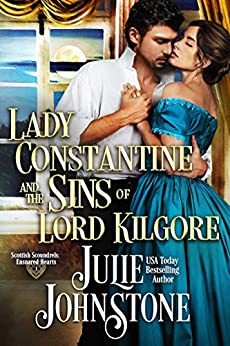
In the game of love, even a rogue can come undone by his own wicked wager.
Callum, the Marquess of Kilgore, long ago accepted that he was no saint. So when he’s offered a shameful bet—to seduce the lady some have dubbed the “Ice Queen” and recover the land he foolishly gambled away—he agrees. Yet, as he comes to know Lady Constantine, he realizes this kind and pure woman deserves far better than a reprobate like himself. Now, he would do anything to protect her from the scandal he helped create, even ruthlessly pushing her away. It seems he hasn’t fallen quite as far into sin as he thought…
But a brush with death and an unexpected offer of a marriage of convenience from Constantine provides an opportunity he never anticipated: recoup his squandered fortune and win back the woman he loves. But before Callum can launch his new plan, a heinous plot rips him away, snatching his freedom and destroying any trace of the man who wanted to open his heart.
Constantine hasn’t a clue what to do when the man she loved, hated, and mourned returns from the dead. Though she is still legally his wife, she certainly doesn’t know him anymore—if she ever did. The seemingly unrepentant rogue appears focused solely on revenge, no matter the destruction it may cause—a far cry from the complex man of honor she once believed him to be. Yet, despite the pain of the past and the demons of the present, Callum still holds the power to inexorably fill her with a yearning and a hope she can hardly control. Suddenly, Constantine wants to risk her heart again for the one thing she has always longed for from the only man she ever cared for—exquisite, unconquerable love.
Amazon – https://www.amazon.com/Lady-Constantine-Kilgore-Scottish-Scoundrels-ebook/dp/B08MH7RQKM
Meet Julie Johnstone Julie Johnstone is a USA Today and #1 Amazon bestselling author. Scottish historical romance, Regency historical romance, and historical time travel romance featuring highlanders, aristocrats, and modern-day bad billionaire bad boys are her love, and she enjoys creating both with a hefty dose of twists, plenty of heartstring tugs, and a guaranteed happily ever after.
Julie Johnstone is a USA Today and #1 Amazon bestselling author. Scottish historical romance, Regency historical romance, and historical time travel romance featuring highlanders, aristocrats, and modern-day bad billionaire bad boys are her love, and she enjoys creating both with a hefty dose of twists, plenty of heartstring tugs, and a guaranteed happily ever after.
Her books have been dubbed “fabulously entertaining and engaging,” making readers cry, laugh, and swoon. Johnstone lives in Alabama with her very own lowlander husband, her two children – the heir and the spare, her snobby cat, and her perpetually happy dog.
In her spare time she enjoys way too much coffee balanced by hot yoga, reading, and traveling.
www.juliejohnstoneauthor.com
https://www.bookbub.com/authors/julie...
newsletter: http://bit.ly/33RCRFf
https://www.facebook.com/authorjuliej...
street team: https://www.facebook.com/groups/15002...
Twitter – @juliejohnstone
Goodreads – https://goo.gl/T57MTA
Bookbub – https://www.bookbub.com/authors/julie-johnstone
Instagram – https://www.instagram.com/authorjulie...







February 18, 2021
The sex workers of Regency England
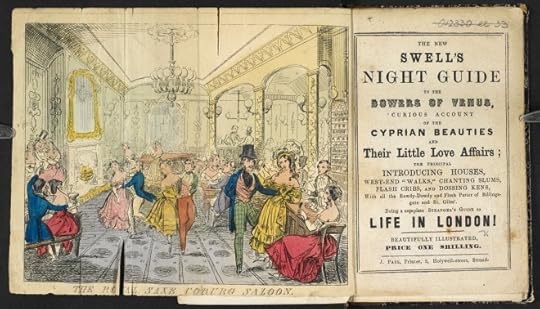
In Georgian England, according to Dan Cruickshank’s The Secret History of Georgian London, one in five women in London earned income from the sale of sex. He called London:
‘a vast, hostile, soulless, wicked all-devouring but also fatally attractive place that makes and breaks, that tempts, inflames, satisfies, yet corrupts and ultimately kills’.
A ban on keeping a brothel was passed into law as early as 1751, but prostitution was not made an imprisoning offence until the 1820s. (Not that the new law stopped the trade, of course, but it did largely drive it off the streets, at least in the more gentile parts of town.)
With no regulation, there are no reliable statistics. Estimates made at the time defined unmarried women living with their partners as prostitutes, and also assumptions about a woman might be based on as little as how high she held her skirts to avoid the fetid rubbish in the streets. While 50,000 (one late 18th century estimate by a judge) is probably well over the top, 20,000 might well be true. Guides to the whores and brothels of London, newssheet accounts and cartoons of the fashionable courtesans at the peak of the trade, their own narratives, and other contemporary records assure us that the sex trade was a thriving part of the economy at the time, and continued to be so in the first decades of the 19th century.
Who worked in the sex trade?Sex workers—defined as those who made some or part of their living by selling sex—ranged from those offering a quick bang up against a wall in a slum alley to those accepting gifts from hopeful admirers while mixing on the fringes of Society. And everything in between.
Most prostitutes seem to have been working class girls who, having surrendered their virtue to a man of their own class, sought some profit from their lapse. One woman said:
‘she had got tired of service, wanted to see life and be independent; & so she had become a prostitute… She… enjoyed it very much, thought it might raise her & perhaps be profitable’
Which it was, giving her enough savings to purchase a coffee house and set up in business. For others, prostitution was seasonal, or a temporary reaction to a financial crisis. Many worked for a year or two, then took their savings home, and married or set up in business. Prostitution might also be a way to supplement income from another job; seamstresses and milliners, in particular, were so poorly paid that many of them sold their bodies as well. So much so, that many took it for granted that all seamstresses and milliners offered sexual services on request, which must have made walking home after work a fraught exercise for those who didn’t.
Where could you find them?Prostitutes were scattered throughout London. Those who worked in wealthier areas, such as the West End, were more likely to find wealthy clients, and those with bit parts in the theatre, who then—as now—might be turned off in a moment if the performance did not please the audience, were well positioned to find a wealthy admirer to keep them in the style to which they would like to become accustomed.
Rewards—and risks
They tended to gather in areas with looser police control; when the police became stricter in the City of London in the eighteenth century, the prostitutes gravitated toward the west and east ends of the city; when police control loosened in the early nineteenth century, they returned to the City. Prostitutes also tended to congregate in areas with cheap lodging houses and lots of men. St. Giles and St. James, home to many cheap boardinghouses, were popular with prostitutes in Westminster; the Docks, where many sailors disembarked, was popular on the east side of the city. – Prostitutes in 18th-Century London
Sir John Fielding, the magistrate, called Covent Garden ‘the great square of Venus’. He said, ‘One would imagine that all the prostitutes in the kingdom had picked upon the rendezvous’. – Prostitution in Maritime London
A clever, pretty, talented girl could hope to attract a generous protector, perhaps even an admirer so besotted he would marry her. It happened, though rarely. More commonly, a man would set his mistress up in a house or apartment, and visit her when he was at leisure until he tired of her or she of him.
Many sex workers, if not most, were in less fortunate circumstances. Those running the brothels sought constantly for fresh girls to please the appetites of their customers. A girl who accepted a job, or even a bed for the night, might find herself put to work whether she wished or not, her virginity auctioned to the highest bidder, and her share of the income withheld to pay for her food, board, clothing, and whatever else the brothel-keeper could imagine.
(I say ‘her’, but of course the same applies to male sex workers, though—homosexuality being illegal—we have little information about their lives, and that little from court records.)
The risks were great. Contraception was very hit and miss, if used at all. Pregnancy must have been a constant worry. ‘Pulling out’ was the most common method for avoiding unwanted children, and was as effective then as it is now (which is to say, not very). Protective ‘Machines’—condoms made from oiled cloth or the intestines of various animals—were available, though men were more likely to use them to avoid disease than to prevent pregnancy. And they were probably better at the second, since water could go right through them and they tended to tear.
Various methods were used to abort unwanted pregnancies, many of them just as likely to kill the mother. A baby could be born alive but then killed, or put out to a baby farmer so that the mother could return to work. A mistress of a single protector might be in a slightly stronger position if the child’s father was willing to keep the mother on. Some men—and not just royal princes—had quite large families by their mistresses.
Disease was the other big fear, for both the sex workers and their clients. Gonorrhea and syphilis were treated with ointments containing mercury, the toxic effects of which could be as dangerous as the diseases. Side effects included kidney failure, severe mouth ulcers, nerve damage, and loss of teeth. On the other hand, untreated syphilis ends in abcesses, ulcers, severe debility, and madness or death. And gonorrhea can spread to the blood and eventually kill. So not good choices.
Not usually a ticket to a better lifeAnd if a sex worker survived these scourges, age was just around the corner. Cosmetics could be used to keep the appearance of beauty, but they had their own dangers. The white pigment used to colour face foundation was very toxic, being lead-based. Rouge might be made of tin. But slow poisoning being better than fast starvation, women painted anyway.
Even those with wildly successful careers seldom came to good ends. Many—probably most—died young. Some married. Some set up in business for themselves and retired rich. And some, like Harriet Wilson, became penniless as their appeal faded. Harriet famously responded by publishing her memoirs, having first warned all her former lovers, and taken out those who refused to pay.
Sadly, the fortune she earned was squandered by the scoundrel she subsequently married, and she died in poverty in France.
SourcesDaniel Cruikshank London’s Sinful Secret: The Bawdy History and Very Public Passions of LondonJudith FlandersVicHeather CarrollJohn Frith






February 16, 2021
Gossip and scandal on WIP Wednesday
Yes, I know I’ve said it again. But Regency romance set in high society does lend itself to the kind of ruthless gossip-mongering that today finds its expression through mean girls at high school and in the darker corners of social media. This week, I’m sharing an episode that shows how scandal can be wielded by a villain (or, in this case, two villains and a villainess). It’s from To Mend a Proper Lady. If you have an excerpt to share, please put it in the comments.
Because they were not socialising, Ruth didn’t notice people acting in a peculiar fashion until Rosemary pointed it out to her. “I wonder what the problem is,” she commented, as they rode home one morning from an early outing to Hyde Park. “Three times today, people coming towards us turned aside onto a different path. I didn’t say anything yesterday, when we took our niece and nephews to play in the square, but Mrs Wilmington collected her children and left, and so did two nursemaids with their charges.”
“You think they were avoiding us?” That had been the norm for a few months during the worst of last year’s feud with the Duke of Haverford, when he was challenging their legitimacy in a complaint to the Committee for Privileges. But their father’s evidence had swung the Committee their way, and most people in Society accepted them now.
Rosemary frowned. “I thought they might be avoiding Zahara’s children, but she and the little ones are not with us today.”
After that, Ruth watched, and soon concluded something was going on. No one was overtly rude, but a very few people directly approached them, and a number went to some lengths to avoid a casual meeting. Either that, or most of the people they came across while out walking were afflicted with a sudden need to cross the street or leave when the Winderfield family came into sight.
Or, more specifically, when Ruth appeared. Her brothers mentioned conversations that left no doubt that they were being treated as normal, and Sophia and Rosemary both had encounters with friends when Ruth was not with them.
It came to a head in Brown’s Emporium, where the ladies of the family had taken Zahara to purchase English cotton and lace, and perhaps an English porcelain tea set. Ruth had grown bored with discussing the relative merits of shawls, and had wandered over to some rolls of heavy fabric that might do for curtaining.
The others where within earshot, so she heard when a lady address Sophia. “Lady Sutton! I had no idea you were in London.”
“Lady Ashbury.”
The name captured Ruth’s attention, and she turned to watch. From the tip of her fashionable hat to her dainty leather-shod feet, the lady was an exquisite doll; the epitome of the English fashionable beauty, fair-haired, pale-skinned and blue-eyed. So this was Val’s sister-in-law?
Ruth stepped closer. The illusion of youth evaporated under closer examinations. Fine lines in the corners of the eyes, around the mouth, spoke of temper and a sour disposition, and those clear eyes were hard as she accepted an introduction to Rosemary and Zahara with a condescending nod.
Sophia turned to hold out her hand to Ruth, beckoning her closer. “And this is my sister Lady Ruth,” she said. “Ruth, Lady Ashbury is related to…”
In one sweep of her eyes, Lady Ashbury had examined Ruth from head to toe, sniffed, and turned her back. “Lady Sutton, I advise you to distance yourself from this female.” She pitched her voice to be heard throughout the cavernous building. “She may have hoped to keep secret her dalliance with my monstrous brother-in-law, but the people near his lands were rightfully scandalised, and have taken steps to ensure the truth is known.”
Sophia, bless her, showed no reaction to the accusation beyond raised eyebrows, and spoke so that the riveted onlookers could hear her reply. “Have you been spreading lying gossip again, Lady Ashbury? My sister was fully chaperoned at all times while nursing your daughter through smallpox. She has the full support of His Grace my father-in-law and all of her family and friends.”
She then turned to the rest of their party. “Ladies, let us come back another time. I find the company here today… malodorous, and I owe you an apology for condescending to make the introduction.”
Ruth was swept along in Sophia’s wake, but looked back as they exited the warehouse. Lady Ashbury remained where they’d left her, staring after them with narrowed eyes. Several of the other customers were already converging on her. This was not over.







February 14, 2021
Tea with Major Heyworth

“Major Lord James Heyworth, Your Grace,” said Eleanor’s butler.
The major, a great bear of a man, stopped in the doorway for a moment, sending his charming scapegrace smile across the room as an ambassador. He had no idea why she had invited him, Eleanor guessed, but had a guilty conscience and hoped to flirt his way out of consequences.
For a moment, she was tempted to investigate further. But there was probably nothing to find. Young Jamie had been at a loose end since arriving back from Waterloo, and was filling the void with alcohol and wild women. That and the untidy situation with his horrid father. But Jamie would not appreciate her interference, and would work out whatever was bothering him in his own time.
“Take a seat, Major Heyworth,” she instructed. “Tea?”He looked at the chairs on offer and chose to sit on the robust sofa opposite her. Eleanor’s companion remained long enough to carry the teacup and a small plate of savoury tarts to the major, then left them alone as Eleanor prepared her own cup.All the time, Eleanor kept up a light conversation: the weather, who was in Town, a coming auction for the benefit of out-of-work ex-soldiers.Jamie continued to look uneasy as he sipped tea, the delicate porcelain dwarfed in his hand. Eleanor decided to take pity on him.“Major, I have invited you here for your opinion on an application to a fund I sponsor. The Fund for Women Scholars, Scientists, and Artisans.”Jamie’s eyebrows shot up towards his hairline as he widened his eyes in surprise.“Me? Are you sure you don’t want my friend Mallet?”Eleanor smiled. “I am seeking a character reference, Major. I believe you and Major Mallet both know the couple in question, but you are in London and Major Mallet, I understand, is in Cambridge.”“Well. Whatever I can do to help, Your Grace. Of course.” He still looked perplexed, but the underlay of guilt disappeared. Whatever had the boy been up to?“I have two difficulties with the application. One is character, which is the reason I wished to speak with you. The couple, and particularly the proprietor of the school, have been the subject of rumours regarding their morality and their ability as educators.”The perplexity was clearing. Jamie was clever enough to have thought about his acquaintances and guessed who she was talking about. She left him in no doubt with her next comment.“The other, I can resolve. They have applied to a woman’s fund for a boys school. But if they are as worthy as their cause, I shall fund them myself.”“Sergeant and Mrs Newell?” Jamie asked.Eleanor nodded, and the major grinned. “I can certainly tell you what I know about them, Your Grace. I am happy to do so.”

Jamie knows Sergeant Newell well, as he served under Jamie’s command during the wars. Jamie has also met the former Miss Abney, proprietor of The Academy for the Formation of Young Gentlemen. All three of them, plus Andrew Mallet, plus several of the young gentlemen, plus an appealing dog and her puppies, face the terror of the storm in Caroline Warfield’s novella in Storm & Shelter.
The Tender Flood: Caroline WarfieldZach Newell knows Patience Abney is far above his touch. But he has been enchanted by her since she raced out of the storm and into the Queen’s Barque with a wagon full of small boys, puppies, and a bag of books. When the two of them make their way across the flooded marsh to her badly damaged school in search of a missing boy, attraction deepens. She risks scandal; he risks his heart.
Storm & Shelter: A Bluestocking Belles Collection With Friends When a storm blows off the North Sea and slams into the village of Fenwick on Sea, the villagers prepare for the inevitable: shipwreck, flood, land slips, and stranded travelers. The Queen’s Barque Inn quickly fills with the injured, the devious, and the lonely—lords, ladies, and simple folk; spies, pirates, and smugglers all trapped together. Intrigue crackles through the village, and passion lights up the hotel.
When a storm blows off the North Sea and slams into the village of Fenwick on Sea, the villagers prepare for the inevitable: shipwreck, flood, land slips, and stranded travelers. The Queen’s Barque Inn quickly fills with the injured, the devious, and the lonely—lords, ladies, and simple folk; spies, pirates, and smugglers all trapped together. Intrigue crackles through the village, and passion lights up the hotel.
One storm, eight authors, eight heartwarming novellas.
Find out more on the Bluestocking Belles’ project page.
Only 99c while on preorder. Published April 13th.







Spotlight on Earl of Shefford

Congratulation to Anna St. Claire on the publication of Earl of Shefford.
Earl of SheffordWicked Earls Club, book #28By Anna St. Claire
Releases 2/16/2021
Colin, Earl of Shefford visits a building he won, having determined its address to be an excellent location for a new club. Discovering not only a fully functioning orphanage but a beautiful headmistress, who refuses his offer of an alternative establishment, he suffers a pique of temper. Irritated by her immunity to his charms, he foolishly succumbs to his intense attraction and brashly offers her a choice. Either she must accept him in a marriage of convenience or provide proof that the orphanage has value to him.
Impoverished and needing to restore her fortunes, Miss Honoria Mason despises the members of the ton for their extravagance and blames them for her family’s loss of home and fortune. Nora’s life takes a turn when the handsome Lord Shefford becomes the orphanage’s landlord. Either she proves the orphanage’s worth to him in two weeks or becomes his convenient bride in order that he may produce an heir. She refuses to lose the orphanage she has worked so hard to preserve and so accepts his offer to marry.
Sparks fly as proximity forces them together, the better to know each other. Yet, how may romance overcome such hazardous beginnings when resentment has stacked the dice against them?
Amazon – https://www.amazon.com/Earl-Shefford-Noble-Hearts-Wicked-ebook/dp/B08GJDTLQL
BN – https://www.barnesandnoble.com/w/earl-of-shefford-anna-st-claire/1137596286?ean=2940162961482
Kobo – https://www.kobo.com/us/en/ebook/earl-of-shefford
Goodreads – https://www.goodreads.com/book/show/55296151
Read an excerpt:Finally! Here was a chance to set the wheels in motion for the fencing club he and his brother had talked about for years. Winning this building had become a prompt in his mind to make it happen. He would have the building renovated to his brother’s specifications and Jonathan would run it. He was the expert in the duello. Their father had encouraged the skill, often sparring with his sons. Colin considered himself more than proficient at the art of fencing; however, Jonathan’s skill was far beyond mere competence. He almost equaled the legendary Angelo.
Besides, Colin reasoned, he was much too busy to run a club. He had taken the bet on faith, being previously unaware of the building’s existence, let alone having knowledge of its condition. Upon reflection, there had been little—if not naught—trustworthy about Wilford Whitton. The nasty knife wound in his own arm, that was still in danger of infection, was proof of that. However, he could no longer tolerate staring at the four walls of his room.
Still involved with the Crown, and now with his estate, Colin found fencing an excellent way of releasing pent up emotion and helping him to feel bobbish. He felt sure this entertainment would also be a welcome diversion within his set at the Wicked Earl’s Club. The gentlemen met almost nightly, and no matter the requirement for amusement, the club could, for the most part, meet it. As yet, it had not provided a fencing saloon.
The sport itself had diminished somewhat in status, overtaken by the popularity of shooting; however, it remained an effective and punishing method of defense that, if vigorously practiced, kept a gentleman’s body at peak performance.
Caught up in the excitement of his thoughts, he picked up his cane and whipped it into a parry at an imaginary opponent—only to be immediately reminded of the stitches he had received only two days ago.
His arm ached, and that Whitton had caused it pricked his pride. He should have been more careful, expecting something from the man. He pulled out his pocket watch, mindful that Bergen and Lord Morray were meeting with him soon.
Where was Joseph? His valet was taking an inordinate amount of time to find a suitable coat. He fingered the frilled cuffs of his shirt distractedly. The man had pursed his lips anxiously when the bandage around Colin’s upper arm did not easily fit inside the brown wool coat he had chosen for today and had hurried from the room, muttering about fetching one with a better fit. Some minutes earlier, he had informed Colin that his black coat had been returned, repaired by his tailor. Presumably, therefore, the man had gone to fetch the garment.
Colin turned his head at the slight knock at the door. “Come in.”
“My lord, I apologize for the delay. I took the liberty of remeasuring the arm openings, in order to compare them with the brown coat. They are just as required and should provide room for your injury. It has also been cleaned.”
“God’s teeth, man! I was wondering where you had gone. I had hoped to view an investment before meeting with my brother.” Colin stretched his arms into the sleeves as Joseph fussed with the shoulders. “It looks better than new. Thank you, Joseph,” he acknowledged in a milder tone. The black coat would suit for what he needed to do today.
Joseph was the grandson of his father’s valet and had proven himself more than capable. The man had become indispensable in the three years he had been in his service.
“Mr. Weston has attached a new sleeve,” Joseph responded abstractedly, still twitching with the back.
Colin wanted to set out. “Have the footman summon my carriage to be brought around, if you will.”
“I anticipated your need, my lord. The carriage is already at the front, awaiting your convenience,” Joseph said, smiling. “Lord Bergen has arrived and is waiting in the drawing room.”
“Your ability to predict my requirements never ceases to amaze me, Joseph.”
“It is merely a part of my duties, my lord. I apologize for not considering the need to accommodate your bandage.”
“Think naught of it,” Colin responded, suddenly feeling guilty about the way he had spoken to the young valet. The lanky young man that shadowed his grandfather in those last years of the older man’s service had matured into a fine young man. Tall, with blond hair, broad shoulders, and bright blue eyes, he was a favorite among Colin’s staff. Surprisingly, it was more for his willingness to help anyone that needed an extra pair of hands than his masculine stature. “Thank you, Joseph.”
Humming to himself, Colin grabbed his cane and joined his friend downstairs. Adam Beaumont, the Earl of Morray had not yet arrived. The Earl was the one gentleman in Colin’s set he had counted upon to give him a realistic idea of the popularity of the venture he had in mind. He was not only a friend, but a frequent sparring partner at Jackson’s Saloon. His opinion on both the location and the popularity of the investment meant a great deal to Colin.
Less than an hour later, his coachman pulled the town chariot into a short, circular drive. Colin and his two friends stepped out of the carriage and stared up at a three-story, faded pink building surrounded by iron railings on a corner, north-east of Mayfair. Russell Square was a respectable if not fashionable neighborhood, yet not considered a dangerous one. He did not wish customers to be set upon by riff-raff. He found it was close enough to his prospective clients, while far enough removed for discretion. The location pleased him.
“Not a bad locality,” he remarked, hoping to spur his friends’ opinions. An instant later, he thought he saw movement in a window and squinted. Are those curtains? It looks inhabited. According to Whitton, this was supposed to be an empty building.
“I thought you had mentioned the building being empty. Unless my eyes deceive me, I saw a woman’s face—a rather charming woman’s face—in that upper window,” Morray said, pointing to the large second-floor window, centrally placed above the door.
“Then I was not seeing things,” Colin retorted in some chagrin. He regarded Bergen, who stood next to him, smiling, having not uttered a word.
Colin prompted Bergen with a slight nudge of his elbow. “He said the building was empty, did he not?” he queried.
“He did. However, he also tried to weasel out of the bet. I am thinking the reasons he failed to share are currently residing in that building, and she has no notion she is being evicted. Unless my memory fails me, this used to be an orphanage before it closed some years ago.” He eyed his friends. “Could it be that it has become so again? I say we should meet the young woman inside and find out. I would like to have a complete story to share with Elizabeth when I return home.” He laughed sardonically.
Colin tried to be irritated with his friend, but he could lay nothing at Bergen’s feet. In fact, he almost envied his friend. Bergen was happily married—something he could never achieve himself. He was uncertain he was even ready to consider marriage at this time. Thomas Bergen had married Lady Elizabeth Newton over five years ago, after discovering her living a quiet but remarkable life, caring for her children and abandoned animals. He had brought her an orphaned donkey he had found while on the way to London, having heard she adopted strays of all types. The donkey, Clarence, had found a home and his friend had found a wife he had not been seeking. Besides the three children she had already adopted, they had twins of their own—a boy and a girl. Lucky fellow, he thought irrationally.
“I cannot see the humor here,” Colin said, irritated. This created a whole new wrinkle in his quest to help his brother. He pulled out the deed and glanced first at a brass sign attached to the railings and then back to the deed. “We have the right of it. Shall we find out what more there is to this story?” It incensed him to be caught like a flat through accepting a chance wager.
“You should probably determine the legitimacy of the paper he gave you,” Morray added in a droll tone. “Yet we are here. I propose we meet the chit and find out what we can.”
Morray was always willing to meet the chit, Colin thought miserably. “She occupies my property and is not grist for your mill, Morray. This may very well be an orphanage.” Even to his own ear, he sounded testy. Perhaps it was the combination of being injured and swindled. He had thought things might not be as Whitton represented, and rather than follow his intuition, he succumbed to the lure of the game. Winning the building presented a suitable solution to his and Jonathan’s desire to honor their father.
Morray snorted. “Ownership remains to be seen, but fear not, my fine fellow. You know innocent ladies are not to my taste. I prefer, shall I say, a more savage entertainment. Your young woman is safe.”
“She is not my woman,” Colin snapped.
“I say, Shefford, you are letting this become bothersome. I have found that the biggest surprises can sometimes turn out to be the best ones. I, for one, am eager to meet the face behind the curtain.” Morray jerked his head toward the same curtain which had moved earlier, revealing a lovely face framed by soft, blonde ringlets staring down at the three of them.
The large oak door at the top of the steps had recently been rubbed down, most likely to prepare for a fresh coat of paint. Colin took in the neatened appearance of the portico and lifted the plain brass knocker to announce their presence. Less than a minute later, a small hatch above the knocker slid open and an older woman’s face appeared for a moment before the opening closed and the door opened.
“Good day, my lords. May I be of help?” A short, mob-capped woman stood at the door, filling the opening.
“I am Lord Shefford, and I wish to look over my recently acquired property. I must admit to being somewhat startled to find the house occupied,” Colin began.
“Oh, dear! Beg pardon, my lord.” The short woman closed the door.
“I say, did you just get the door closed in your face?” Bergen gibed.
“Stubble it, Bergen.” He lifted the knocker and gave three quick raps.
“I am sorry, Shefford. I should not be fooling at your expense.” Bergen smirked, putting the lie to his apology. “’Tis just that this reminds me a little of my first meeting with Elizabeth. I think I am merely amused by the coincidence.”
“This has no similarity to when you met your wife, I assure you. I am not meeting my future wife,” he grumbled as the door opened again. The older woman had disappeared, replaced by a beautiful young woman dressed in a plain cotton dress of a deep navy-blue color, covered with a white apron. She had golden blonde hair, bound neatly in a loose chignon, and chocolate brown eyes—eyes a man could lose himself in. “May I speak with your employer, my dear,” Colin said politely.
“Good day, my lords.” She bobbed a curtsey. “My name is Miss Mason and I am the headmistress here. Please forgive my housekeeper’s lack of deference.” She paused, smiling sweetly. “We are unaccustomed to having many visitors, especially gentlemen as distinguished as yourselves. Have you come to make a donation to the school?”
Meet Anna St. Claire Anna St. Claire is a big believer that nothing is impossible if you believe in yourself. She sprinkles her stories with laughter, romance, mystery and lots of possibilities, adhering to the belief that goodness and love will win the day.
Anna St. Claire is a big believer that nothing is impossible if you believe in yourself. She sprinkles her stories with laughter, romance, mystery and lots of possibilities, adhering to the belief that goodness and love will win the day.
Anna is both an avid reader author of American and British historical romance. She and her husband live in Charlotte, North Carolina with their two dogs and often, their two beautiful granddaughters, who live nearby. Daughter, sister, wife, mother, and Mimi—all life roles that Anna St. Claire relishes and feels blessed to still enjoy. And she loves her pets – dogs and cats alike, and often inserts them into her books as secondary characters.
Anna relocated from New York to the Carolinas as a child. Her mother, a retired English and History teacher, always encouraged Anna’s interest in writing, after discovering short stories she would write in her spare time.
As a child, she loved mysteries and checked out every Encyclopedia Brown story that came into the school library. Before too long, her fascination with history and reading led her to her first historical romance—Margaret Mitchell’s Gone With The Wind, now a treasured, but weathered book from being read multiple times. The day she discovered Kathleen Woodiwiss,’ books, Shanna and Ashes In The Wind, Anna became hooked. She read every historical romance that came her way and dreams of writing her own historical romances took seed.
Today, her focus is primarily the Regency and Civil War eras, although Anna enjoys almost any period in American and British history. She would love to connect with any of her readers on her website – www.annastclaire.com, through email—annastclaireauthor@gmail.com, Instagram – annastclaire_author, BookBub – www.bookbub.com/profile/anna-st-claire,Twitter – @1AnnaStClaire, Facebook – https://www.facebook.com/authorannastclaire/ or on Amazon – https://www.amazon.com/Anna-St-Claire/e/B078WMRHHF?ref=.








